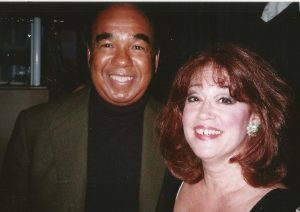Bistro Bits: Summer Serenaders, Part 1 – Jane Scheckter and Marieann Meringolo
No denying it. Summer is winding down now. Daylight hours are gone by 8pm. Technically, there are still a few weeks left in the season, but they’re flying by.
There have been some terrific cabaret turns this summer—seen by some as “off season” for cabaret. This week and next, Bistro Bits will center on a quartet of talented musical artists who have presented summer shows—all four of them women.
Today, it’s two stalwarts: Jane Scheckter and Marieann Meringolo. These two share an authoritative stage presence that seems to come from their knowing just what they’re about, where they shine brightest, and how best to draw an audience into their spheres.
Scheckter was maybe a bit more laid back than Meringolo, whose show felt somewhat more calculatedly structured. But both were present every moment, and each of them could roll with the punches and throw out an ad-lib or 10 when need be. Both of them gave us a heaping helping of something it’s not always easy to establish on a cabaret stage or any stage: authenticity.
Jane Scheckter: Bobby Is Her Hobby, and She’s Dishing It Up
Sometimes you go to a cabaret show and you’re immediately pulled into an emotional maelstrom, tracing the arc of a singer’s personal story, in which he or she overcomes (or at least comes to terms with) some problem or other. It’s all played out dramatically, song by song. A bit before reaching the one-hour mark, you’ll get to a denouement—with luck, an honest one that shows that the performer truly has become stronger and/or smarter for the struggle. And, as the last sand runs through the hourglass, enough minutes remain for the singer to thank the musicians, advocate for the wait staff, perform an encore, and leave the stage in order to greet attendees in the lobby or near the bar.
Those can be exciting, rewarding, and, at their best, spellbinding cabaret evenings. But you may leave the club exhausted from all the catharsis.
On the other hand…on a hot, humid late-July evening—in an election-year in a world filled with conflict and misinformation—maybe you’d rather attend a show like the one I saw Jane Scheckter present at Pangea: Jane Scheckter Loves, Adores, Misses Bobby Short (the newest iteration of a show that was first presented at Eighty Eight’s in 1996).
Playing to a packed room, this warm and welcoming singer delivered 19 songs associated with the singular talent that was Bobby Short. Scheckter’s performance was both elegant and relaxed. The patter was sometimes funny and sometimes touching, and sometimes a blend of the two. Her singing and interaction with the audience came without a lot of fuss. She simply presented each song to us as though it were a blossoming flower in a terra cotta planter: healthy, full of color and fragrance. This was, in fact, a tribute show not only to Short but also to his repertoire. It’s obvious that she loves the numbers she sang at Pangea—yes, because they’re associated with the late, great Café Carlyle showman whom she loved, adored, and now misses, but also because, apart from that, they’re clever, charming, and irresistible songs.
She began with the title that introduced her to Short, Frank Loesser and Victor Schertzinger’s “Sand in My Shoes,” which she heard on a jazz radio station at age 12. Her singing style was conversational here, but she could also flare out with emotion. In the final moments of the number, she surprised me with a big burst of volume that was just as right as it was unexpected. (She delivered several thrilling finishes, similar to this one, throughout the evening, )
In her initial bit of patter, Scheckter talked about her instant infatuation with Short’s vocal style on first hearing it: how she recognized it as something new and different from that of other singers. She told of her subsequent purchase of Bobby Short albums with her allowance money. She described nervously inviting Short to one of her early tribute shows for him (he attended and he liked it!). And she spoke about making his personal acquaintance and even visiting him on multiple occasions when they were both abroad in France.
All songs in the show were written between 1925 and 1956, and Scheckter grouped them in interesting ways. Describing the 1930s as a time of fervid cultural innovation and productivity (the Great Depression notwithstanding), she presented two songs from 1932 that dealt with the relationship between love and money. Victor Young and Sam F. Lewis’s mesmerizing “Street of Dreams” made the case for love, while Vernon Duke and E.Y. Harburg’s “Speaking of Love” comically illustrated a more practical commitment to the material world. (I found the latter to be the most enjoyable selection of the evening, but then I am partial to the wit of lyricist Harburg, who was represented in the evening by two additional songs, “Don’t Let It Get You Down” and “Down with Love.”)
Scheckter spoke of three ideas she picked up from Short about choosing repertoire:
First, that it’s probably better to sing an obscure song than a famous one. Next, no “woe-is-me” songs, unless they’re presented in a wry, ironic way. Finally, look to songs that have introductory verses (and include those verses!). She then convincingly illustrated the usefulness of this tri-part methodology with three songs: the Gershwins’ “I’ve Got Beginner’s Luck” and two Cole Porter titles: “So Near and Yet So Far” and “It’s Bad for Me.”
The success of the show was augmented by the work of Scheckter’s musicians: gents she has worked with extensively over the years. Musical director Tedd Firth gave the room an exuberant piano interlude on “So Near and Yet So Far,” which also included striking musicality from bassist Jay Leonhardt. Peter Grant on drums was an asset as well, especially when he zapped us with a well-timed rim shot during “Speaking of Love.”
This is one of those shows I could revisit repeatedly. And I hope I’ll have the chance to do so soon. (Attended July 31.)
Marieann Meringolo: Milestone Birthday Party
Known for her potent vocals and her ability to extend a clarion note to Streisand-ian lengths, Marieann Meringolo (at The Green Room 42) began The Birthday Show, Vintage 1964!, not surprisingly, with Merrill and Styne’s “Don’t Rain on My Parade.”
But Meringolo—resplendent in a bright, floral-patterned pantsuit—started not at the beginning of this pyrotechnic song, with its famous pulsing vamp, but instead, in medias res, with the bridge that leads into the big finish (“I’m gonna live and live now…”). It takes some measure of audacity to begin a show at such a high-pitched moment. But it was Marieann’s birthday party, and she sang what she wanted to! Something a bit audacious seemed right for the occasion.
In her opening bit of patter, she joked about the obviousness of her birthday show’s title: “Vintage 1964—you do the math!” She later explained that the original intention was to perform only songs from that year, but she wound up not adhering precisely to that formula.
One of the finest turns in the show was, indeed, a fun-filled medley of top-40 pop songs from 1964, beginning with “Dancing in the Street” and wrapping up with “Can’t Buy Me Love.” The brightest moment in this song-string was probably her vivacious take on The Supremes’ “Where Did Our Love Go?” (Brian Holland/Lamont Dozier/Eddie Holland). Meringolo’s very-engaged musical director, Doyle Newmyer, piped in with the song’s famous echoing backup call (“Baby, baby”).
Later highlights included a wise and warm “Summer Highland Falls” (Billy Joel) and a comedic song that I’d heard her sing once before: a deliciously cheeky “What Did You Do to Your Face?” (Susan Werner). On the latter, she made the character’s shifting attitudes toward a friend’s recent makeover (alarm lapsing into piqued interest and morphing into envy) uproarious and quite glorious. [Correction: On 11.2.24, I spoke with Marieann Meringolo, who told me she had NOT previously sung this song in NYC. before the show I attended. I was apparently remembering someone else’s performance of the Werner number. My apologies.]
There was also a second medley: songs made popular by Dionne Warwick. The decision to end this grouping not with an uptempo song but with a ballad—in this case, Burt Bacharach and Hal David’s “Alfie” (from the film of the same name)—was not necessarily a misstep. However, for whatever reason, Meringolo experimented by excising the name “Alfie” from the song entirely. (Perhaps she wanted to make it more universal and not conjure up images of Michael Caine?) I, unfortunately, could think of nothing else during this performance but of how, exactly, she would wind up bending the melody to accommodate the name’s omission, especially in the song’s final measures. She got through it, but my advice (to her and others) would be not to repeat this experiment going forward.
Elsewhere in the show, however, Meringolo did something that demonstrated to me what a quick-thinking and resourceful performer she is. This was during her performance of Nicola Paone’s “Italian Menu”: a song with lyrics consisting of names of food items from an Italian restaurant’s bill of fare. She began maneuvering through this fast-paced, tongue-twisting list song with ease and high spirits when, all of a sudden, she lost her place. She looked to Newmyer for help, but he was unable to prompt her. It was one of those nightmare scenarios for a singer. She tried to go back and pick things up again, but stumbled once more. And yet, through it all, she paradoxically seemed in total control, ad-libbing furiously and hilariously and including us all in her valiant (and, eventually, successful) efforts to get through the mess. The mishap became a grand and happy adventure for everybody in the room and earned Meringolo one of the biggest rounds of applause that evening.
Lina Koutrakos directed the show. Joining Newmyer in supporting Meringolo were bassist Boots Maleson, drummer Brian Woodruff, and special guest on guitar, Meringolo’s girlfriend, Nancy Brown. (Attended August 9 .)
OK. Enjoy another week of (dwindling) August. Next week, I’ll take a look at recent shows by Julie Benko and Laurin Talese.
###
About the Author
Mark Dundas Wood is an arts/entertainment journalist and dramaturg. He began writing reviews for BistroAwards.com in 2011. More recently he has contributed "Cabaret Setlist" articles about cabaret repertoire. Other reviews and articles have appeared in theaterscene.net and clydefitchreport.com, as well as in American Theatre and Back Stage. As a dramaturg, he has worked with New Professional Theatre and the New York Musical Theatre Festival. He is currently literary manager for Broad Horizons Theatre Company.







